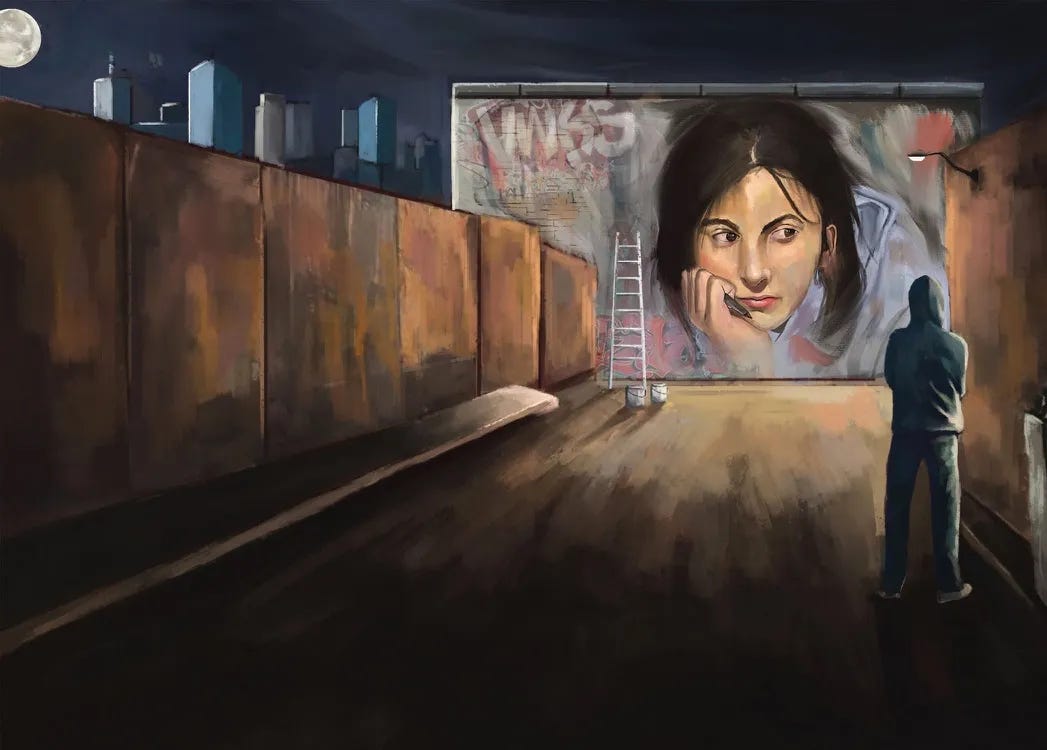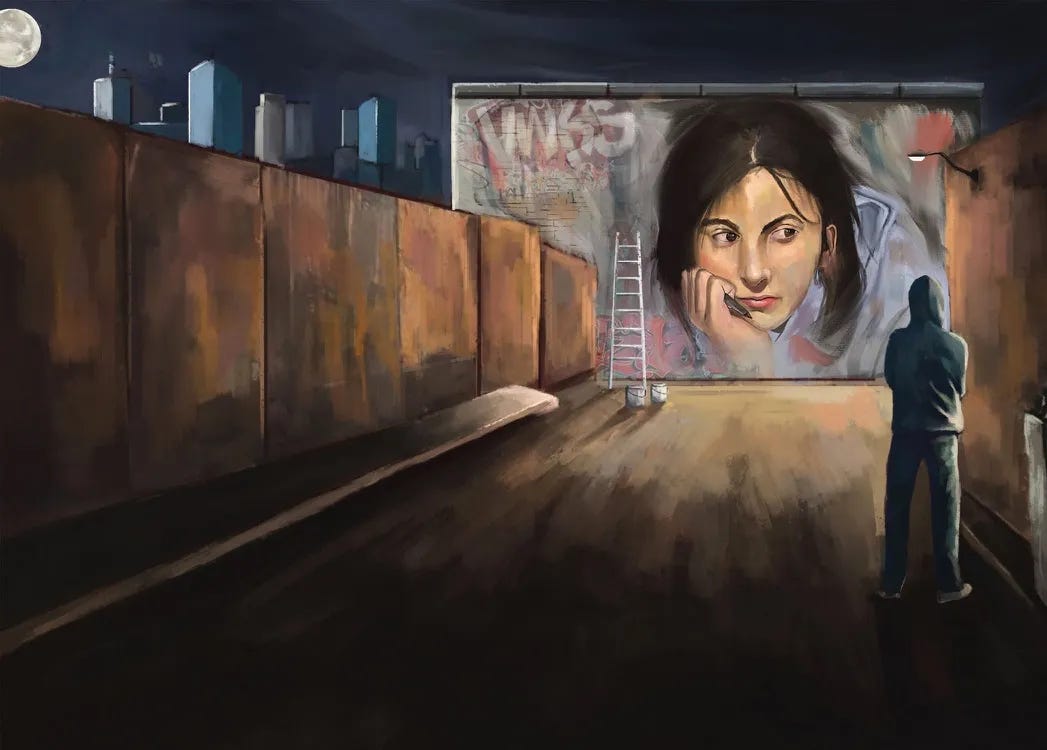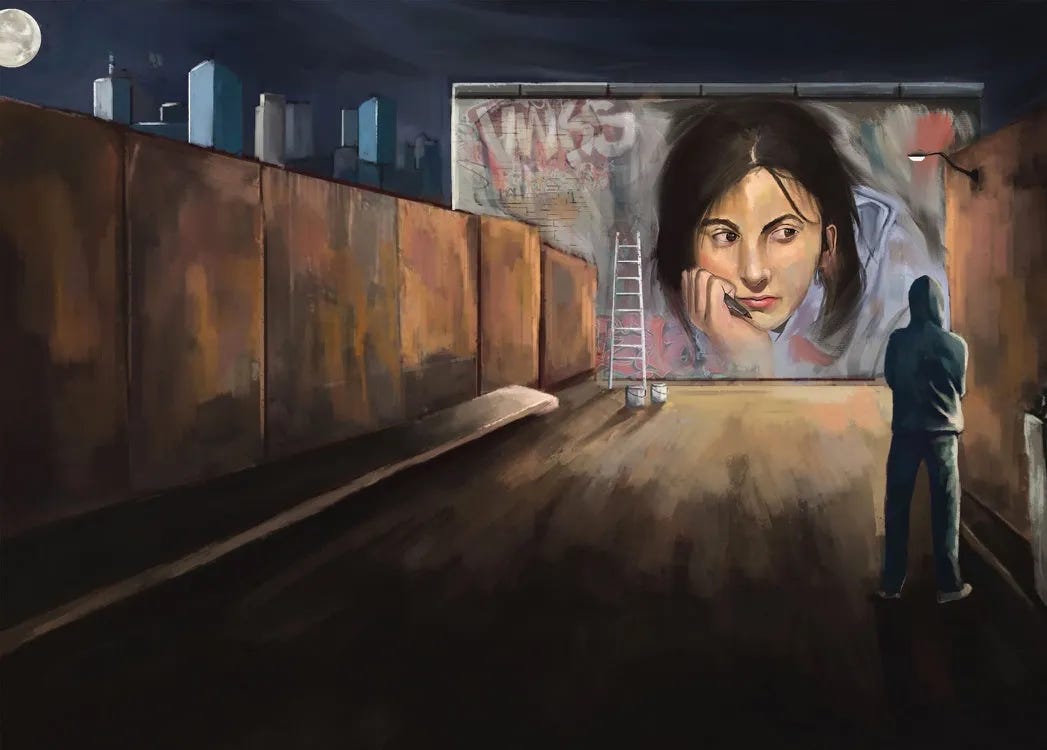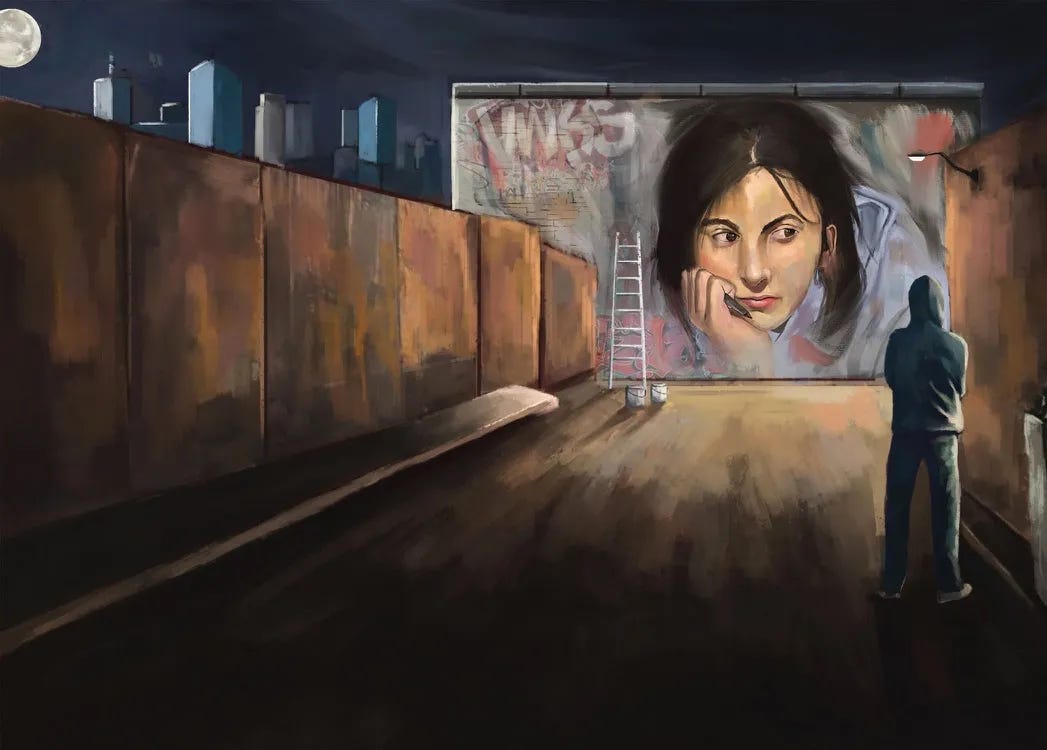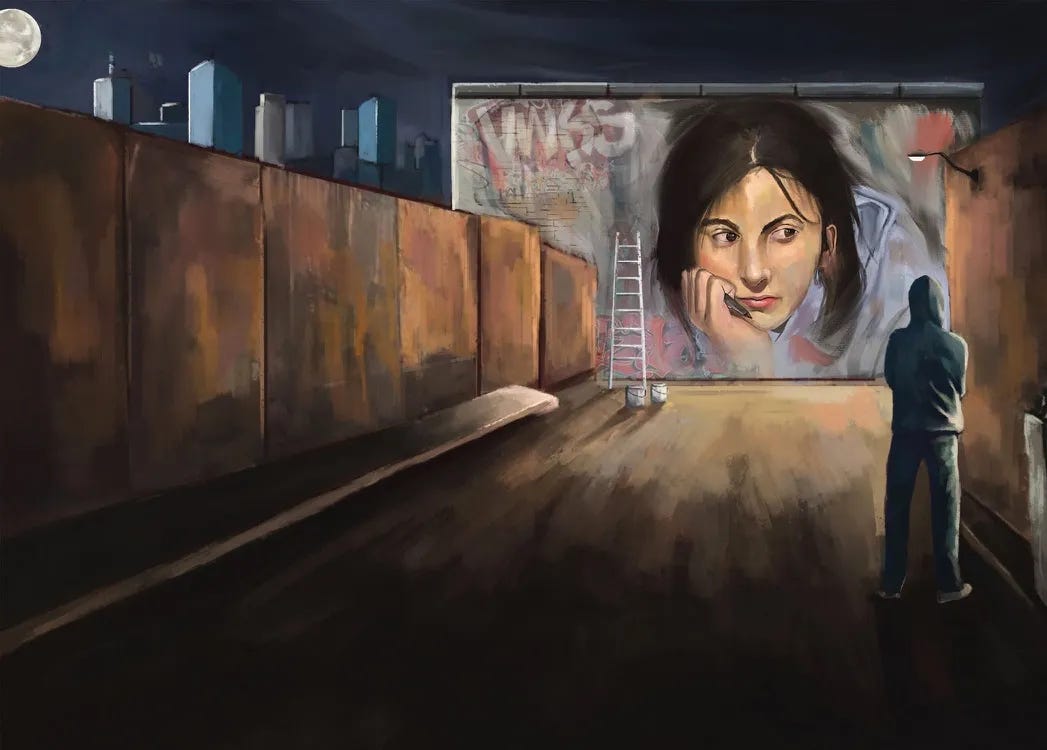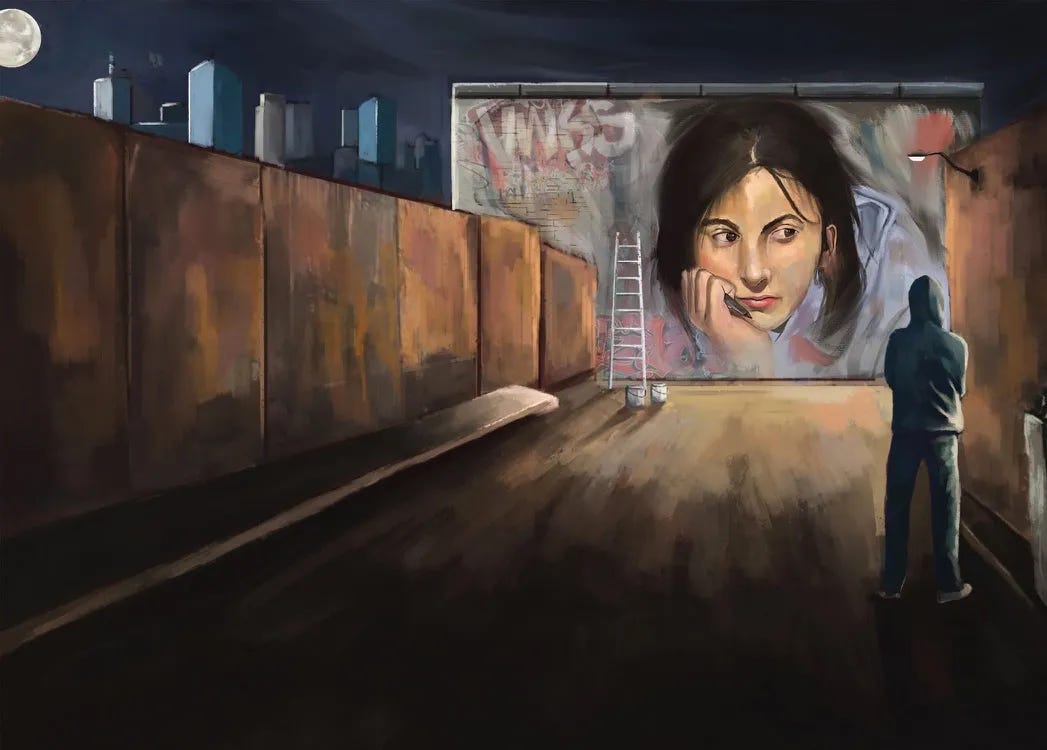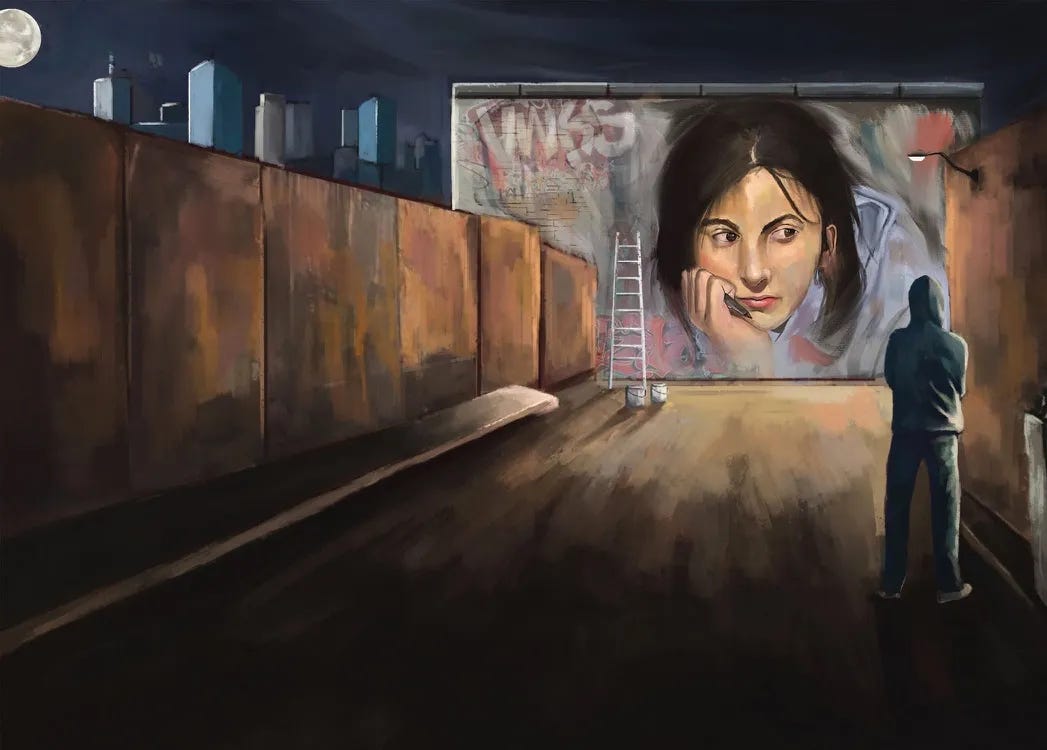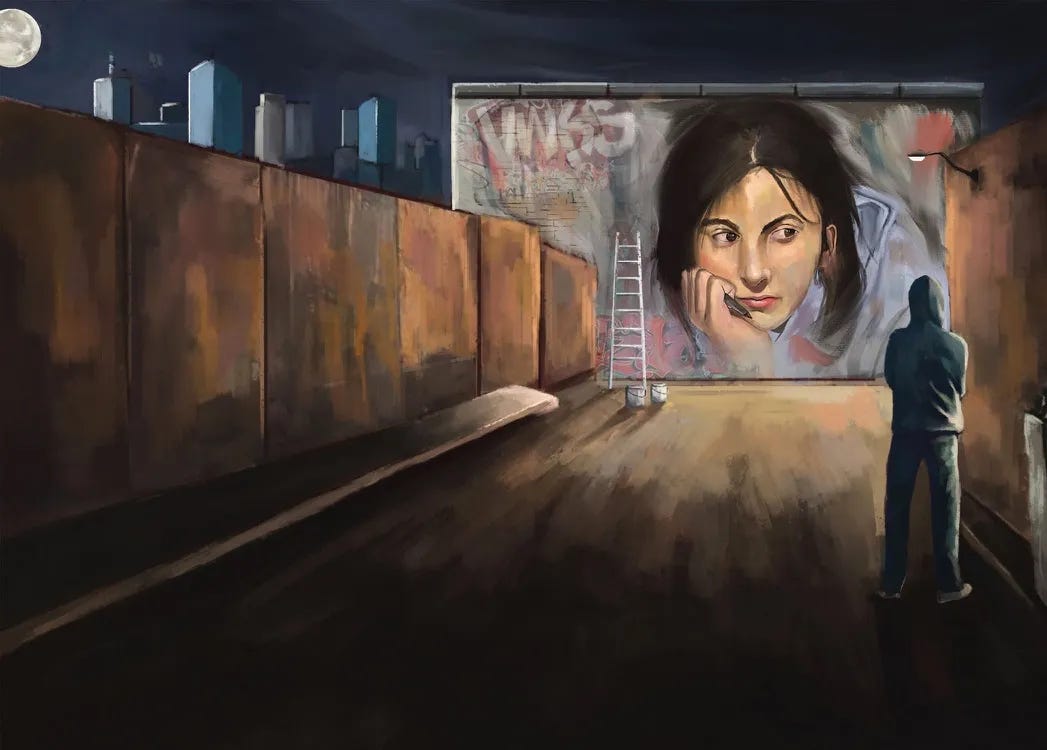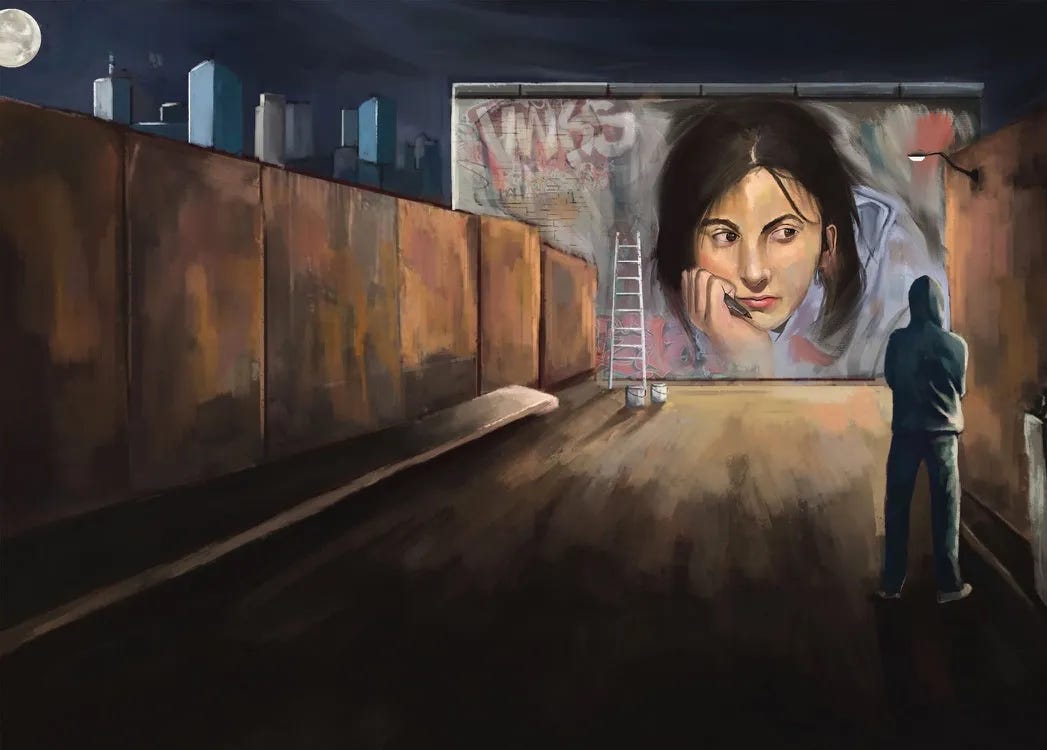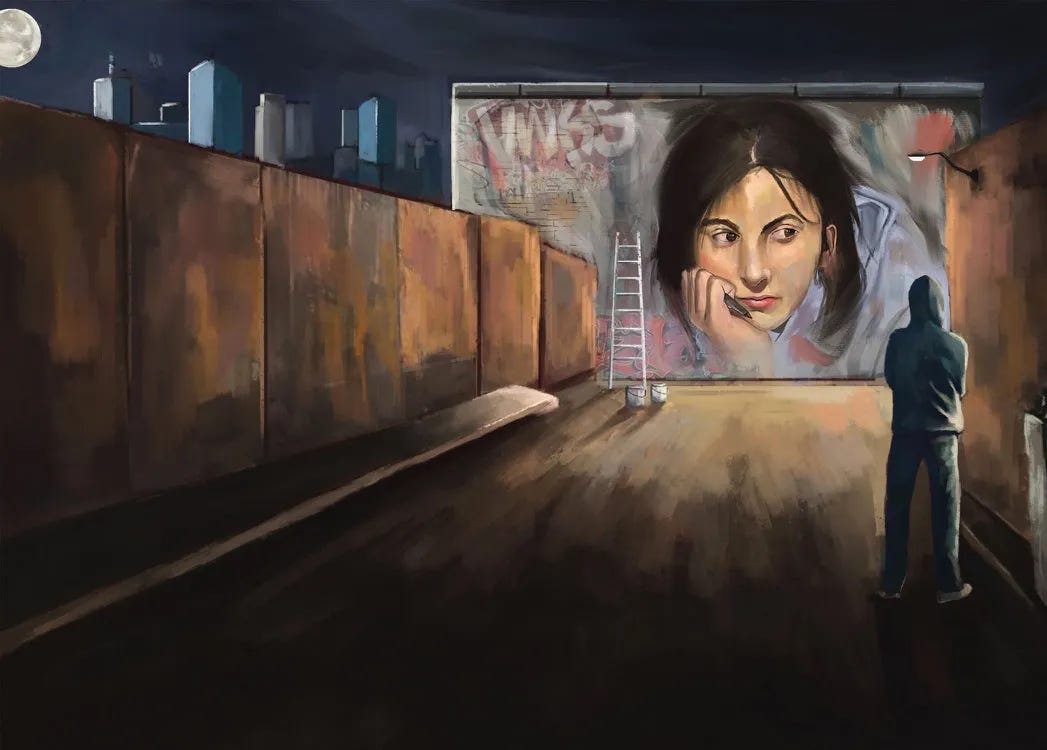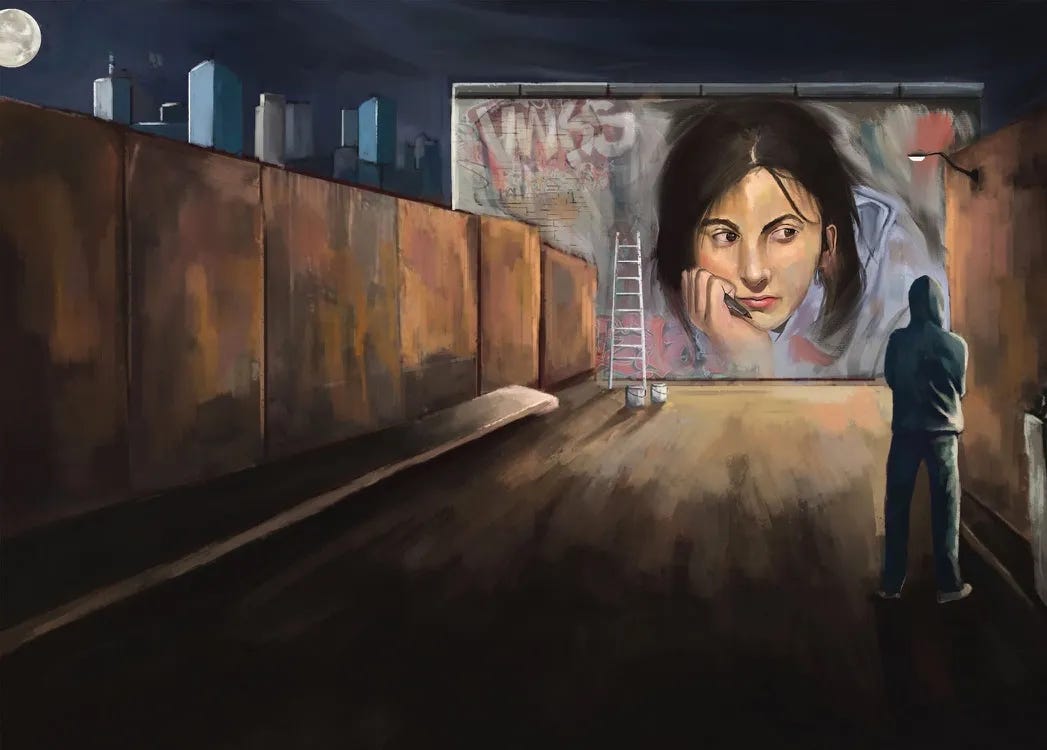It is late afternoon when Molly mounts the carpeted stairs in the light-filled foyer of the Melbourne Teaching Institute. It’s an old building, drab and Victorian on the outside, but renovated and modernised within, with a vast skylight above. There are paintings on the walls, colourful modern stuff, all pinks and greens and rich blues, smudges and dots and out-of-focus figures. Very twenty-first century Australian, thinks Molly. Though she doesn’t know much about art, she’d like to have some of these at home.
There’s an open plan reception area at the top of the stairs, with black chairs – is that real leather? – and magazines on coffee tables.
‘Molly McInness?’ says the receptionist warmly.
Molly nods. There’s something seductive about the place, about the friendly welcome. Molly isn’t sure whether it’s to reassure or disarm her.
‘Ms Aldridge has someone with her just at the moment and they’re running a little late. Would you like a coffee? A glass of water?’
‘No thanks,’ says Molly. She doesn’t return the young woman’s smile. She’s girding her loins.
Molly stares out of the window as she waits and tries to recall Max’s advice. Imagine that Gillian Aldridge is interested in what you have to say.
As the minutes tick by, Molly feels less and less at ease. She has been falsely accused by a cabal of small-minded dickheads. She’s being kept waiting in order to be grilled about patently false and malicious allegations. She can feel what Max has called her white hot indignation stirring.
‘Ms McInness. Ms Aldridge is ready to see you now.’ The receptionist is standing. ‘Would you like to follow me and I’ll take you to her office.’
Molly doesn’t respond immediately. Instead, she takes a couple of deep breaths. She’s no longer aware of the big windows, the plush surroundings, the smell of fresh coffee. Instead she senses an internal coiled spring of mixed emotion – part fury, part righteousness – readying itself for release.
She follows the receptionist down the hallway to a large office with a glass wall and a half-open door.
‘Come in Ms McInness,’ says a voice, and Molly enters. The office is orderly and welcoming. There are books in the shelves, lots of them, and Molly is surprised to see that they’re not just public service publications. Ms Aldridge is perhaps a reader. Imagine she’s someone who’s interested in you, someone with whom you can enjoy a good conversation.
But Gillian Aldridge does not look at ease. Indeed she seems to be having trouble looking Molly in the eye. She indicates a chair and then sits behind her desk.
‘Thank you for coming in,’ says Gillian Aldridge, opening a file that sits in front of her on an otherwise bare desk. ‘You have read the allegations?’
‘I have read them,’ says Molly. There’s steel in her voice.
‘You understand, I hope, that you are not being judged by me at this meeting. I just want to give you an opportunity to give me your version of events, your perspective.’
‘And then?’ says Molly.
‘Normally our preference is for a reconciliation between the parties, and an agreement about how things should proceed and so on. But I need to let you know that your principal has requested that, whatever the findings here, you no longer work at his school. He would like to see you transferred.’
‘Or sacked.’
‘He is not making the decisions here, Molly. Can I call you Molly?’
‘Can I call you Gillian?’ Molly is filled with the sense that her white hot indignation speaks more eloquently than … well more eloquently than just about anything.
‘Of course,’ says Gillian Aldridge. ‘I know how hard this must be.’
Molly just glares at her.
‘But it is important that we use this time for you to respond, to give me your version of events.’
There’s something insulting, Molly is feeling, about the phrase ‘your version of events’, as if she’s being invited to give some self-interested but unlikely explanation.
For the next twenty minutes or so, Molly lets loose the coiled spring. She talks about the high standards she has in her English class, how insincere writing makes her angry, and how Tran is a master of the slick and superficial. She speaks passionately about Harriet’s love of story, of her brave attempts to find ways of expressing deep thoughts and conflicted feeling, both in her reflective writing and in her fiction. She talks about the contrast between the Zeph who emerged as a casualty of Rodney’s Jensen’s sarcasm and the Zeph who wrote the rationale. She rails at the allegation that she has played favourites when it’s Rodney and Elliot who have pandered to Tran and, no doubt, to Tran’s father.
‘And you have evidence of these things?’ says Gillian when Molly draws breath.
‘It’s common knowledge,’ says Molly, though she knows she’s gone too far.
‘And the allegation that you wrote or encouraged Harriet to write a scurrilous and possibly defamatory sketch of Mr Jensen in her story?’
‘Utter malicious nonsense,’ says Molly, pleased to be back on what feels like more solid ground. ‘Harriet wrote that scene, without discussing it with me beforehand. I read it, of course, and could see that the character had certain similarities with Mr Jensen …’
‘Or her version of Mr Jensen.’
‘Or her version of Mr Jensen. But then that’s what writers do. We draw on our experience, we write from life.’
‘You didn’t think you had a responsibility to suggest to Harriet that such a caricature might be inappropriate, coming from a student?’
‘I was more interested in encouraging Harriet to be the best writer she could be. I’m her English teacher.’
‘And Mr Jensen’s colleague.’
‘If you could hear the things he says about me, about the students …’
‘It’s your actions that are under investigation at the moment, that’s what we need to be looking at.’
‘This is just so unfair, so totally screwed. They can say what they like and get away with it.’
‘They can say what they like, but there are consequences if what they say is found to be in itself malicious and without foundation.’
‘Fat chance that’s going to happen.’
Gillian Aldridge ignores this – has she even heard it, Molly wonders – and suddenly Molly loses steam. She sits for the rest of the meeting, either shrugging her shoulders at the various ridiculous allegations or giving hollow little laughs. She feels insulated by her anger and by a sense of existing beyond the pettiness and nastiness of the whole business. She’s glad Max isn’t present to see and judge.
But as she walks down the carpeted stairs and then out into the bustle of the city, Molly has a sinking feeling that she’s played into their hands. They want a victim, they want to be able to support the status quo, and she’s probably allowed them to have what they want. They’ll dismiss her as over emotional, unstable, perhaps unfit to be a teacher.
Fuck them, she thinks. If this is where trying to be a good teacher gets you, I’m better out of it.
Zeph has been gone for over a week now. Ten days I think, but my brain isn’t working all that well. Maybe it’s because I’m so tired. I haven’t been sleeping much. Maybe it’s because whenever I slow down and try to think about things calmly, I feel this tidal wave of panic approaching and I get scared. Maybe if I write I’ll be able to settle the turmoil. I haven’t written for a long time. I haven’t felt like it.
I’m in his room writing this. I’m sitting on his bed. Some of his stuff is still here, his school things and most of his clothes. The room still smells of Zeph, a kind of warm familiar smell that I didn’t realise existed until now. He couldn’t have taken much. I’m glad the rain has gone away. I’m glad it’s nearly summer and the night’s are warmer.
Is he even in Melbourne still?
I’ve been everywhere looking for him. I’ve been to the warehouse just about every day. I’ve been to his old apartment. I’ve got on trains to the city, the same one where we had that first conversation. When was that? August? Just a couple of months ago? It’s hard to believe that I’ve only really known Zeph for about three months.
The other morning, before school, I went to the warehouse and just sat in front of his painting. I cried a lot. I imagined him doing the painting over days. I saw in my mind his face when he showed it to me. So proud. So pleased that I liked it. I thought about the time I showed him my story, and how he went off to his room for hours to read it, then came out and gave me the biggest hug. I thought about his face in class when Ms McInness got him to read his rationale. He’s changed. He used to be so closed up, so impenetrable, so invisible. Then he painted the door and I wrote the story and he came to live with us and I think we came to kind of love each other. I loved him anyway. I love him. I feel this ache now that he’s gone.
He’s beautiful. I would never have said that before all this happened, before I got to know him. He seemed mousy then. But he’s got this great smile and these big brown eyes, and when he’s trying to explain something and the words won’t come he starts rubbing his chin and pulling his hair and I laugh at him and he starts to laugh. I really really miss him.
I’ve been putting missing person messages out on social media. I’ve also started putting posters up around the place. I’ve got some photos of him on my phone, and I got one of them blown up by Ms McInness and I made the poster and she made photocopies for me. I put them up all round the suburb, in shop windows when I was allowed, in alleyways, in the warehouse, at the library. I put my phone number on it, and some dickhead keeps ringing me. I was fooled first time when he said he knew where Zeph was and that he’d take me there, but when I questioned him, he got all evasive and I knew he was lying. He’s rung a few times. I get so frustrated and I shout and swear and stuff, but that probably just encourages him.
Ms McInness has been off sick for most of this week. I don’t feel like going to school myself, especially English where there’s this empty seat. The Head of English has been taking our class. She’s OK, I guess, but she’s not Ms McInness.
I think Zeph must have lost his phone or run out of credit or something. He never answers. But I keep trying.
I don’t know how he survives. He’s got no money and not many clothes as far as I can tell.
Grandpa’s trying. I mean in a good way. He helped me put up posters. I didn’t expect that.
Every day when I’m walking back from school, I think I’ll find that Zeph is there when I get home. I keep actually expecting it. It’s more than hoping. I get convinced for some reason. It’s the same when I wake up in the morning, I have this feeling that Zeph has crept in during the night and that he’s in the room next to me. I felt it again this morning.
He wasn’t though and I’m beginning to think that he’s gone for good. That I’ll never see him again.
I want someone to blame. Sometimes it’s been Grandpa. Sometimes it’s people at school. Sometimes I find myself being really angry with Zeph, like it’s his fault. He should have been stronger.
Molly stands at the kitchen window in her pyjamas, her hands cupped around a tepid cup of tea, the morning outside bright in the spring sunshine and full of the drone of peak-hour traffic. School will start within the hour, and the playground and halls will already be filling with jostling rowdy adolescents sharing videos or messages on their phones, or laughing together about some shared or rumoured exploit. The staffroom urn will be bubbling away, and the smell of cheap coffee will greet the staff as they enter the building. Teachers will be grumbling about the latest emails from the department or executive. Perhaps in the English staffroom, Molly imagines, they’ll be talking about her.
This is her third morning off work, her third morning of sick leave. Stress leave.
She’s barely been out of the house. She’s barely been out of her pyjamas. A lot of the time she’s been sitting up in bed, just staring out the window, not thinking about anything in particular, though there have been times when she’s felt furious, or sorry for herself, or revengeful. But for the most part, just passive, without energy. As though she’s withdrawn herself from the world.
But now she’s out of bed and standing by the kitchen window.
There’s a spider’s web just on the other side of the window, stretched between the eaves and the lemon tree. It glistens and shimmers in the early morning sun. The spider, Molly assumes, is curled up inside the leaf in the centre, its overnight work done and its prey consumed. It will be out again later, repairing and weaving.
She has tried reading but cannot lose herself in the words on the page. Thoughts, feelings, keep intruding. If she’d followed Max’s advice, would she have had a chance with Gillian? Why aren’t others, like Rhonda for example, standing up to Elliot?
She suspects, sometimes, that she is one of life’s victims, somehow sending off pheromones that incite the bullies to strike. She can think of plenty of times in her life when she’s been vulnerable and bullied. She has always been emotional.
She remembers again that day, as a young girl, dancing on the cushions and being filled with a kind of ecstatic joy, and then seeing her mother’s disapproving face at the door. She’s felt some of the same joy in her English classroom. It seems that the world disapproves.
She’s feeling sorry for herself, she knows, and she doesn’t like it. It never helps. It’s probably never justified. Others suffer way more and get on with things. Why is she so incapacitated, one moment by rage, the next by a sense of futility?
Max has tried to help. But he is wanting Molly to play a game she feels she cannot play. She’d rather fail than compromise.
She pours the cold tea down the sink and puts on the kettle. As she waits for it to boil, she wanders into her living room. The fire is dead, and it’s unseasonably chilly on this November morning. Moby Dick lies unfinished on a table, open but face down in just the way that used to appal Molly’s mother. ‘Use a bookmark, why don’t you use a bookmark Molly? You’ll ruin the book.’
Molly would like to read this morning, but she knows she won’t. Her mind is too agitated. But she yearns to escape into another world where some character is struggling to live an authentic life in a cold and shallow world.
Zeph sits with his back to the outside fence of the city railway station. People stream past, most avoiding his eye, but those who look down at his artwork hesitate, smile, and some reach into their pockets and throw money into his plastic cup. He’s got at least fifteen dollars he guesses, and he’s been here less than an hour.
Zeph needs money for a bus fare to Byron Bay up north in Queensland. What he’ll do when he gets there, he’s not sure. Marcie says she knows someone who knows someone. They live off the land up there she reckons, do a bit of busking, casual farm work. Weather’s good, people help each other. He’ll be OK, she says. But he needs to get there first and the bus fare is over a hundred dollars.
It’s his artwork that’s doing the trick. He wanted something different, something that stands out from the growing number of beggars on Melbourne’s streets, each with a plaintive note scribbled on battered cardboard. So Zeph has spent the last couple of days creating a series of four oil paintings on cardboard called ‘From beggar to artist’. On each of the panels he’s drawn a stage in a life.
Panel 1: The Artist as Beggar (with an idealised version of Zeph sitting humbly as the crowds stream by).
Panel 2: The Artist at Art School (with Zeph handing over money from his begging bowl to the receptionist at an art school).
Panel 3: The Artist at Work (with Zeph, now a man, in a loft studio, books open around him, artworks on easels, bed unmade in the background).
Panel 4: The Artist at the Opening (with Zeph surrounded by admirers in a gallery, with art from Panel 3 displayed on the walls).
The panels – telling a story of ambition, hope and talent – seem to be resonating to the commuters. Some of them, anyway, and a few add a smile or a word of encouragement as they drop a coin into the punnet.
He’ll have his bus money before the weekend is finished.
Build the base securely, but always with an eye on the next objective.
Was this something that he’d read, or that his father has instilled in him? Or had he come up with it all by himself? Elliot isn’t sure.
He is sure, though, that it’s right. He’s built a career on the principle.
It means you are always doing two things at once. Addressing the present and looking to the future.
Like right now. It’s Sunday but Elliot is in at work. He loves the silence, the sense that he’s alone in his domain.
The base, this school, is looking increasingly secure. The focus has, until now, been on getting things in order. The gutters had just been a start, a kind of signal that attention would be paid to detail, to clear objectives, to changes that made an immediate impact. Explicit and measurable learning objectives was a more significant, and more difficult, step taken to secure the base, to move the school up the rankings, to bring things into line. That there were casualties – the Zephs and Mollys of the world – was not only inevitable, it was good for all concerned. It taught the importance of teamwork, of discipline and a single focus. It pointed, in a confused and overly complex world, to what was achievable and valued. It secured the base.
But securing the base is never enough. One secures the base in order to lay the groundwork for the next step, the next objective.
Elliot doesn’t want to be a principal forever. Seeing into Tran’s father’s home was not the first time the world of local politics had beckoned.
Secure the base by getting rid of the anarchic individualists, but make connections that will smooth the path for the next step.
It’s worked before for Elliot. It will work again.
Max is cooking alone in his kitchen. Given that there’s a cold and untouched pizza in the fridge from Friday night, and that Harriet is unlikely to be in, he’s not sure why he is cooking at all.
He hasn’t seen much of Harriet all weekend. He hasn’t seen much of her for over a week. When she wasn’t at school, she was out searching in vain for Zeph, fixing her posters to walls and shopfronts, talking to the police and to welfare agencies. She’s visited shelters and hospitals and she must be exhausted. But she’s eating little and Max wonders why he is cooking.
To feel useful, he’s guessing. To feel involved. He can’t think of what else to do.
And maybe to assuage the guilt he feels that he’s responsible for Zeph’s disappearance, that his prickliness – and he knows he’s been unreasonably prickly – has driven Zeph away. Harriet seems to have got over blaming him, but he feels guilty all the same. Perhaps he is cooking to atone.
Max has tried several times to ring Molly, but Molly’s not picking up the phone. Perhaps he should just go round to her place and knock on the door, though clearly she wants to be left alone. He gathers the meeting with Gillian Aldridge hadn’t gone well and that Molly has not been at school for the best part of the week.
Max has lived through times like this before and he knows that sometimes trying too hard to fix things has been more about his need to be the fixer than a genuine concern for the other. Maybe it’s just best to let things unravel and to be the stable base to which others can return when the time is right.
Maybe. He knows that Harriet trusts him to be around when she needs him. But who has Molly got? He worries about her withdrawal, her silence. He’ll talk to Harriet about it tonight, when she comes in. If Molly doesn’t show at school in the morning, maybe the two of them should go and knock on her door.
Max has been reading more Spinoza. A lot of it is too dense, too framed in a language he cannot comprehend. But there are key ideas that resonate. Every organism has some kind of inbuilt drive to become more itself which leads it to make connections (some collaborative, some combative) with other organisms. Human comprehension is limited and utterly incapable of comprehending the multifaceted complexities and subtleties of the world. Humans are not separate from the kingdom of other beings, but are subject to the same laws and are part of the one system.
Exactly why these thoughts are important to Max at this present moment, why they resonate now, is not entirely clear. Perhaps because they offer some kind of explanation of the complex and mysterious web of interactions he finds himself enmeshed in at present. Zeph, Harriet, Molly are all being driven to become more authentically themselves, and it’s a blind drive, often unconscious or irrational that propels them to do what they do. The state in which he finds himself – cooking alone in an empty house – is not some random and meaningless act but the inevitable result of a whole series of little actions and impulses that set off tiny chain reactions that then constitute a present moment, itself a partial cause of what is to come. His actions and moods and impulses might be totally incomprehensible to him, might be beyond his capacity to comprehend, but they are a tiny meaningful part of a big meaningful picture.
He hopes.
The sauce is ready, the pasta is cooking. He will eat alone or with Harriet. Molly will emerge or disappear. Zeph will leave their lives or rejoin them. Something is taking shape, some future events are being formed. He is a part of an incomprehensible unfolding.
It’s a settling thought in an unsettled and distressing time.
The first half of the chamber music concert is finished, and Gillian Aldridge has made her way to the fresh air on the balcony and is now sipping black coffee from a polystyrene cup. The coffee is a bad idea, she knows, as she won’t sleep, but it does taste good. No doubt the fact that she’s thumbing her nose at good sense amplifies the pleasure.
As usual, she is at the concert alone. This is as she likes it, a preference which she knows is welcomed by her less musical husband.
Gillian loves chamber music, especially when the piano part (as in tonight’s Faure) plays so prominent a role. She used to play the piano, and still does occasionally, but never now in public. How grand it would be to play it as well as tonight’s pianist, to set the quintet in motion, to set the mood, to be the first exponent of a theme that each of the string players then picks up before stepping back and allowing the piano again to lead the way. She loves the way the music carries her along, takes her out of herself, hints at worlds – so many of them – beyond the borders of the mundane.
The bell will ring soon to summon her back for the second half, which will begin with the four string players playing Beethoven’s Grosse Fugue. She heard this piece for the first time when she was a young woman, and found it strange and discordant. All over the place actually, as if it was some kind of raw cobbling together of ill-fitting musical ideas. Strong ideas, most of them, but at first she couldn’t hear the underlying connections, the unifying and convincing theme or mood or direction. It had taken some study and many listenings for her to be convinced by it, and it was now a piece she kept coming back to, hearing something new each time. She was looking forward to hearing what tonight’s performance would be like.
And then for some reason her thoughts drift back to the meeting earlier this week with Ms McInness, and to the report Gillian will finalise tomorrow.
It was such a shame that Ms McInness had been so prickly and unhelpful in their meeting. Gillian had hoped this young and idealistic teacher would give her some sound and defensible reasons that would allow her to dismiss the allegations. Gillian had read some of Harriet’s story and had been impressed. No doubt there were good things happening in this classroom; the truth was undoubtedly much more nuanced than the allegations were suggesting. But Ms McInness hadn’t done herself any favours. She was, in some ways, her own worst enemy.
Perhaps Ms McInness would learn from this. She was a good teacher doing good work who hadn’t understood that a person in Gillian’s position needed more than passionate protestations in order to make a decision.
‘Have you seen Tran? We’re meant to be playing tennis.’
Councillor Hieu Van Pham has just come down from upstairs where he’s been having his regular weekend afternoon nap. His wife, Sophia, is pottering in the kitchen. They’ve been entertaining the extended families – hers and his – for their weekly Sunday lunch and there’s a lot of clearing up to do. In their early years together, Hieu had offered to help, but Sophia preferred he kept out of her domain.
‘He left while you were asleep,’ she says. ‘He didn’t say anything about playing tennis.’
This is disappointing. For some time now, Hieu has been concerned about Tran. For years really. An only son of an over-indulgent mother. Perhaps, if he’s honest, the only son of an absent father. He’s spoilt now, this boy, and lazy. Expects the world to be similarly indulgent and forgiving.
Hieu has been wanting to be more involved, especially now that the election is over and he has a little more time. More involved than the occasional conversation with that rather silly Principal at the school. The tennis match was meant to be the start.
But Tran has disappeared. Something will have come up, something more immediately to his liking. Hieu knows that his son wouldn’t have thought twice about a prior commitment.
Hieu walks slowly towards his study, but then changes his mind. Instead he settles into one of the soft leather sofas in the TV room. He takes out his phone and texts:
‘Where are you?’
The reply is instantaneous.
‘????’
‘We’re meant to be playing tennis together.’
‘aw shit sorry dad forgot tomoz ok?’
From what hell hole do they get this language? And on what planet is Tran that he’s forgotten that tomorrow is Monday, a school day.
‘Come home now. Will meet you on the tennis court.’
‘No can do dad soz.’
This is unbelievable. Hieu stops texting and rings Tran’s number.
Tran doesn’t pick up.
As soon as he enters the front door of his inner-city apartment (how good it is to live now at a distance from the school and in the heart of fashionable Melbourne), Rodney takes his jacket off (but not his tie). He places the dark jacket carefully on the bed (he will brush it and then hang it after he’s had a drink), picks up the review section of The Sunday Age (Is there a show in town he might see after dinner?) and makes his way out onto the balcony, passing by the fridge and collecting a bottle of riesling and glass that is now satisfyingly chilled. It is unseasonably hot and humid on this early December Sunday and the church had been stuffy. The prospect of a light breeze and a cold drink on the balcony is one he’s been pleasurably anticipating since the service ended.
Rodney likes his Sunday morning routine. Up early, a stroll around the Fitzroy Gardens, reading the paper with a coffee and croissant from the bakery, then church and a lunchtime drink. In the afternoon, mark some student work before an early dinner, then a film or show in town, then bed.
Today, though, there has been a discordant note. The new priest is slightly unsettling. He is too young, for a start, and Rodney worries that he’ll start messing around with the order of service, or, worse still, try to modernise the language. St. Albans has been until now the only truly high Anglican church left, the only one that still uses the King James Bible and the unmodernised Book of Common Prayer. It is a sanctuary of poetic sanity in a fragmenting world increasingly unsure of itself. At one dreadful moment in this morning’s service, Rodney thought the new priest was about to invite some adolescents in the front row to produce guitars and sing some ghastly version of Psalm 23. Mercifully it had turned out to be a false alarm.
It is pleasant on the balcony overlooking the Gardens in this part of inner city Melbourne. There are still buildings and churches from the early colonial period that wouldn’t have looked out of place in George Eliot’s rural England. Rodney loves it here, and loves his weekend life of quiet routine.
He will spend the afternoon reading student essays. He will enjoy crafting pithy comments designed to wake them up from their twenty-first century stupor. The English classroom, like St Albans and like parts of old Melbourne, is one of the few remaining places where enduring traditions and values live on.
Long may it last.
Tran switches off his phone. He hates sacrificing the possibility of a buzz in his pocket to signal a new Snapchat post from one of his hundreds of friends. But he switches it off all the same. He doesn’t want to be bothered by his father. Especially now, in the shoe shop, as the shop assistant hands him a single Adidas Ultra Boost, clutching its pair as if afraid Tran might do a runner with it. Racist bastard, Tran thinks.
But as he runs his hand along the shoe’s rounded plastic spikes, and as he takes in its heady blend of copper green, purple, smokey white and charcoal, and as he marvels at the contrasting textures – the snake skin base, the ice smooth purple wave, the shiny black straps and the intricately ribbed surface – he finds he’s stopped breathing. This is what beautiful is.
‘How much?’ he asks, trying to sound calm though it’s an effort to speak.
‘$270.’
Tran hears the dismissive tone in shop assistant’s voice, the assumption that it’s out of Tran’s league.
‘Can I try them on?’ Tran regrets framing it as a question. It sounds weak.
The shopkeeper hands Tran the second shoe. Then watches. He’s like a guard. Tran feels like punching the creep.
The shoes fit perfectly. It’s like they were made for him. Tran stands up and walks around. He moves towards the entrance. Not that he’s thinking of bolting. Just to irritate the shop assistant.
‘Put them to one side for me. I’ll come in tomorrow and get them,’ he says. His mother will give him the money, he’s sure she will. He’ll think of some way of doing a deal with her. Maybe on the strength of his school results? He could exaggerate his expectations. She’d gone for that one in the past.
‘You’d need to leave a deposit,’ says the dickhead, carefully wrapping the shoes in their tissue paper and then placing them back in the box. ‘Twenty percent.’
‘No problemo,’ says Tran, ignoring the supercilious hostility.
He’ll have those shoes by tomorrow. It will be hard making the time pass between now and then. He tries to think of what might distract him.
Rhonda sits observing from the back of her Year 8 class. Observing her pre-service teacher, but her thoughts have drifted.
Drifted first to Elliot’s self-satisfied face as he greeted her in the hallway before school. Has he heard something about Molly’s fate? It seems likely.
Drifted then to her first year as an English teacher. Why she’s thinking about this, she’s not really sure. Perhaps it’s the face of Tania, the pre-service teacher, eager and terrified at the same time. That’s how Rhonda felt in the first months of that first year.
When did it begin to shift, she now wonders? When did she lose that feeling of being a fraud, of pretending that she knew what she was doing?
And then she realises. It was the day she worked with Andrew, the Year 7 boy who had asked if she could help him write a sonnet.
The task was to write a poem, but for some reason Andrew was really keen to write a sonnet. The influence of his home, perhaps, his mother an academic in the English faculty at Melbourne University. Rhonda had met with Andrew before school for a week or so, and she’d taught him about iambic pentameter, she’d read him various sonnets, and they’d talked about possible subjects for his poem. Then one morning he’d handed her a piece of paper on which was written his own fourteen-line sonnet called ‘The Mole’. She can still remember – though it was more than 20 years ago – his first two lines.
He burrows in the porous ground below,
Unseen, unheard, alone in earthy dark.
It was, she thought then and she thinks now, quite perfect.
From that day on, Andrew saw himself as a writer. Rhonda saw herself as an English teacher.
It should be a good memory. But, as Rhonda recalls it today, she’s aware of a sudden heaviness in her chest.
I’ve just seen him. About an hour ago. My heart won’t stop pounding, like I think it’s going to explode. What’s going to happen? What’s he going to do?
I was in the city, at Southbank, showing all the homeless beggars I could find Zeph’s photo and asking if they’d seen him. Nothing. But I had this feeling that some of them recognised the photo. I started to think he was still in Melbourne, that he was close by.
So I stalked the streets.
Near Southern Cross station there was this little crowd gathered at a gate. That’s when my heart started heaving, as if it knew that this had something to do with Zeph.
Then I saw the paintings and I knew it was him.
He didn’t see me at first. He was squatting down behind his displayed work, talking to an old woman about his paintings. She gave him a couple of dollars. ‘Thank you,’ he called. His voice was cracked, like he’s been sick or something.
‘Hi,’ I said, and he looked up. He didn’t seem startled or anything. Just looked at me.
He looked shocking. His eyes were red and rheumy and sad. He looked as though he’d lost weight. His face was gaunt.
Someone dropped some silver into his plastic bucket and he turned to acknowledge it. Then he looked down at the ground.
‘Hi Zeph,’ I said again.
‘Hi,’ he said, still avoiding my eyes.
‘Zeph, look at me,’ I said.
‘I can’t,’ he said.
‘Zeph, look at me.’
But instead of looking at me, Zeph put his hands over his face. Then he started to sob.
‘Zeph, come home.’
I knelt down beside him. The little crowd around him had melted away, embarrassed maybe. It was just us two.
I put an arm around him, but he shrugged it off. Then, still sobbing, he started to gather up his paintings.
‘Zeph, look at me,’ I said again. I wanted to make contact, but he wouldn’t look. He stood up, his paintings under his arm, and started to walk away. Then he broke into a jog. A blanket that had been around his shoulders slipped off, but he kept going. I picked it up.
‘Zeph, your blanket. Zeph! Please. We want you to come home.’
Then he was gone. He disappeared amongst the crowd and I couldn’t see him any more.




